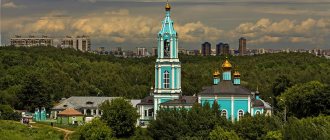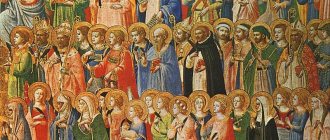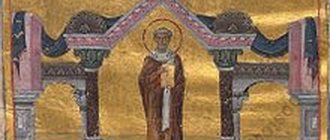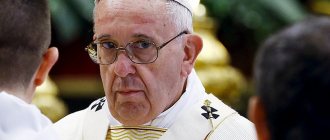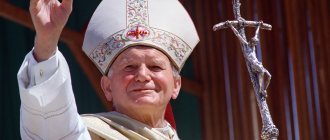| prot. Gleb Kaleda |
Kaleda Gleb Alexandrovich
(1921 - 1994), archpriest. Born on December 2, 1921 in Petrograd. His father, Alexander Vasilyevich, was a prominent economist, graduated from the Minsk Theological Seminary and the Petrograd Polytechnic Institute. Mother came from the noble family of the Sulmenevs. Father Gleb considered himself indebted to her for his church upbringing.
In 1927, upon moving to Moscow, the family established close spiritual ties with former members of the Russian Student Christian Movement. At this time of mass persecution of the Church, the family’s small apartment turned into a temporary shelter for repressed clergy and members of their families hiding from the authorities or going into exile from exile. The first spiritual father of Gleb Kaleda was the future martyr Vladimir Ambartsumov. Father Vladimir had a great influence on the formation of the boy’s spiritual personality. Already as a teenager, Gleb became involved in the service of the Church: he searched for hiding Orthodox clergy in the Moscow region and delivered material assistance to the families of repressed priests.
In 1933, his mother died, and Gleb’s father’s further spiritual education took place in illegal Christian circles, led by A. V. Filinova, a former activist of the Russian Christian Socialist Movement. At school, he developed an interest in natural sciences and began to dream of entering a geological exploration institute.
| G.A. Kaleda at the front (1942) and on the 45th anniversary of the Victory (1990) |
However, the end of school coincided with the beginning of the Great Patriotic War, and he was drafted into the army. From December 1941 until the end of the war, he was in active units and, as a radio operator in a division of guards Katyusha mortars, participated in the battles of Volkhov, Stalingrad (now Volgograd), Kursk, in Belarus and near Koenigsberg (now Kaliningrad). His comrades believed that it was only a miracle that he remained alive. He returned from the front with numerous awards.
Scientific and spiritual growth
In the fall of 1945 he entered the Moscow Geological Prospecting Institute. Soon he met the secret priest Father Sergius Nikitin, the future Bishop of Kaluga. After the opening of the Trinity-Sergius Lavra, he met the governor of the Lavra, Archimandrite Gury (Egorov), later Metropolitan of Simferopol. Father Gury introduced him to Father John Wendland, the future Metropolitan of Yaroslavl, who before church service was a geologist. The spiritual guidance of Fathers Gury and John largely determined the future life path of Father Gleb.
In 1951, having graduated from the institute with honors and entered graduate school, he married Lydia Vladimirovna Ambartsumova, the daughter of his first confessor. They spent their honeymoon on a geological expedition. After graduating from the institute, he received the blessing to engage in scientific activities, although at that time he already had the desire to devote himself entirely to serving the Church. In his scientific activities, he was guided by the covenant of the Apostle Paul: “ And whatever you do in word or deed, do everything in the name of the Lord Jesus Christ, giving thanks through Him to God the Father.”
"(Col 3:17). Annual scientific trips to Central Asia made it possible to regularly communicate with Bishop Gury, at that time the Bishop of Tashkent.
Successfully engaged in scientific research, he defended his candidate's dissertation in 1954 and then his doctoral dissertation in 1981, becoming a major and published specialist in the field of lithology. At the same time, he saw his duty in protecting Orthodox dogma from pseudoscientific criticism, wrote apologetic works, insisting that “ superficial scientific knowledge (half-knowledge) alienates people from God, while complete knowledge brings them closer to the Creator
" His favorite saints were the Church Fathers, theologian and scientist Basil the Great, as well as the defender of Orthodoxy, Athanasius of Alexandria. Following the traditions of the Christian student movement, he organized an illegal Christian circle that existed until the 1990s, in which the children of his friends studied - a prototype of Sunday school.
Secret priesthood
In 1972, Bishop John (Wendland), who returned from abroad, ordained him a deacon and then a presbyter. This was done secretly, since the high education of Father Gleb made his legal ordination impossible under the conditions of government oppression of those years. While remaining the head of a department at a scientific institute, he began to regularly celebrate the Eucharist in his home church. He does a lot of spiritual work; he has many spiritual children who find support in his love and wisdom. During this period he wrote a large theological work, “ The Home Church.”
”, conceptualizing family life as service - by this time the Kaled family already had many children.
However, all his priestly activities remained secret, only his closest people knew about it. He, a doctor of sciences, would immediately be arrested if anyone found out the truth. For eighteen years, services were held in the apartment of a multi-story panel building, behind the tightly curtained windows of his office. The priestly chasuble was a tablecloth onto which crosses were sewn and then each time carefully pulled apart; the suit was kept among the bed linen so that during a search it could pass for a nightgown. A new crystal wine glass served as the cup for Communion, and a scalpel was specially purchased to extract particles from the prosphora, with which he then served until his death. Almost every Sunday the whole family and a few friends initiated into the secret gathered for the Liturgy. A large sketchbook was unfolded - a throne, and in the next room the radio was turned on so that even the neighbors would not hear.
«A priest, like a doctor, should always have his door open
“, said Father Gleb. He spent hours confessing those wishing to undergo the sacrament of repentance in his office, but even later, already openly serving in the parish and confessing dozens of people, he was never in a hurry. Moreover, he did not recognize the practice of general confession, which in the Soviet years arose due to the fact that the authorities did not encourage particularly close contacts between priests and laity.
| Athens, Areopagus. Father Gleb at the stone from which the Apostle Paul preached |
Entering open ministry
In the late 1980s, Father Gleb took an active part in the creation of a Sunday school at the Church of the Prophet Elijah the Ordinary, of which he had been a parishioner since the post-war period. Here in 1990, with the blessing of Patriarch Alexy II, he entered into open ministry. Later he was assigned to the Synodal Department of Religious Education and Catechesis. With his active participation, Catechetical courses were created in Moscow, and he became their first rector. They were then transformed into the Orthodox St. Tikhon's Theological Institute. Under his leadership, a lot of educational and methodological work was carried out on Orthodox education and the denunciation of emerging sects and heretical false teachings.
Father Gleb combined Christian enlightenment with presbyteral service in the Church of St. Sergius of Radonezh in the Vysoko-Petrovsky Monastery.
| O. Gleb in one of the cells in Butyrka prison |
Prison Shepherd
Through his efforts, the Church of the Intercession of the Virgin Mary was recreated in Butyrka prison. He celebrated the first Liturgy in the Butyrsky Church on Bright Week 1992. Gradually the temple was transformed, an altar was made; many donated church and service items there. On October 23, 1993, Father Gleb, by decree of Patriarch Alexy II, was appointed rector of the Butyrsky Church - the first after seventy years of desolation.
In prison, both the guards and the prisoners fell in love with Father Gleb. The inhabitants of the cells were waiting for his visit, treated him with deep respect, and begged him to stay with them longer. He left the prisoners after lights out and returned home well after midnight. He was the father of six children, and this experience of fatherhood was fully revealed in his pastoral ministry. He treated each of the prisoners as a son according to the flesh, and many only through him first felt the very concept of fatherhood. He took all the hardships, misfortunes and downfalls of everyone very close to his heart.
Father Gleb was also in the death row. The first time he went in there, the warden was outside the door holding the door with his foot to keep it closed. And then Father Gleb came, told them to come for him in an hour, the door was closed, and he sat with the death row prisoners; hugged them, tried to bring them gifts, apples. For Easter I was very worried about Easter cakes and eggs being taken there. He spent many hours on death row, alone with them. I baptized several of them, and they reviewed their entire past lives. Father Gleb has repeatedly said that he has never seen such fervent prayer as on death row. What he saw there convinced him even more of the need to abolish the death penalty, because, in his words, “ we sentence one person to death, and execute a completely different one.”
»…
Priest Gleb Kaleda died on November 1, 1994 in the Botkin Hospital in Moscow after a serious illness. His last words were: “ Don’t worry, I’m very good.”
».
Family
Of the six children of Glab Kaleda and his wife Lydia Vladimirovna, four received a medical education, two received a geological education. Two sons became priests, and one of the daughters became an abbess.
| His Holiness Patriarch Alexy II awards Father Gleb with the pectoral cross (1993) |
Ratings
Word from Patriarch of Moscow and All Russia Alexy II:
Remembering the father of Archpriest Gleb Kaleda, you involuntarily think about his life path.
Scientist, professor, doctor of sciences. Secretly ordained during difficult years for the Church, who created a home church in his apartment in which the whole family was raised - with the advent of religious freedom in our country, he revealed himself to the world as a shepherd - zealous, zealous, gifted with life and spiritual experience. Being a secular scientist, he studied theology and accumulated a wealth of experience in spiritual knowledge, which was so useful to him in the future ... [1]
Family
In 1951, before defending his thesis, he married Lydia Ambartsumova (nun Georgia, resident of the Stavropegial Conception Monastery, died in 2010), the daughter of his first confessor, priest Vladimir Ambartsumov. Of their six children, four received medical education, two received geological education:
- Sergei is a doctor, died along with his wife in a car accident.
- John[7] (born January 20, 1954) - priest, rector of the Church of the Life-Giving Trinity on Gryazekh at the Pokrovsky Gate
- Alexandra - wife (now widow) of priest Alexander Zaitsev
- Kirill[8] (born 07/07/1958) - priest, rector of the Church of the New Martyrs and Confessors of Russia at the Butovo training ground
- Maria (Abbess Juliana; born 1961) - abbess of the Conception Stauropegic Convent
- Vasily is a psychiatrist, Doctor of Medical Sciences, Deputy Chief Physician of the Scientific Center for Mental Health of the Russian Academy of Medical Sciences.
Gleb Aleksandrovich’s cousin is Honored Doctor of the Republic of Belarus Vasily Ivanovich Kaleda.
Proceedings
The list of his scientific publications includes over 170 titles. At the same time, he sought to protect Orthodox doctrine from pseudo-scientific attacks. During the period of Khrushchev's persecution, he wrote an apologetic work, “ The Bible and the Science of the Creation of the World.”
", in which he showed the absence of fundamental contradictions between the biblical and scientific ideas about the origin of the Universe.
After secretly accepting the priesthood, he compiled a large theological work, “ The Home Church
,” in which he examined the family as a special church ministry.
Excerpt characterizing Kaled, Gleb Alexandrovich
Rostov lived, as before, with Denisov, and their friendly relationship, since their vacation, had become even closer. Denisov never spoke about Rostov’s family, but from the tender friendship that the commander showed to his officer, Rostov felt that the old hussar’s unhappy love for Natasha participated in this strengthening of friendship. Denisov apparently tried to expose Rostov to danger as little as possible, took care of him and after the case he especially joyfully greeted him safe and sound. On one of his business trips, Rostov found in an abandoned, devastated village, where he had come for provisions, the family of an old Pole and his daughter with an infant. They were naked, hungry, and could not leave, and did not have the means to leave. Rostov brought them to his camp, placed them in his apartment, and kept them for several weeks while the old man recovered. Rostov's comrade, having started talking about women, began to laugh at Rostov, saying that he was more cunning than everyone else, and that it would not be a sin for him to introduce his comrades to the pretty Polish woman he had saved. Rostov took the joke as an insult and, flushing, said such unpleasant things to the officer that Denisov could hardly keep both of them from the duel. When the officer left and Denisov, who himself did not know Rostov’s relationship with the Polish woman, began to reproach him for his temper, Rostov told him: “How do you want it... She’s like a sister to me, and I can’t describe to you how offended it was for me... because that... well, because... Denisov hit him on the shoulder and quickly began to walk around the room, without looking at Rostov, which he did in moments of emotional excitement. “What dug’ak weather you have, G’ostovskaya,” he said, and Rostov noticed tears in Denisov’s eyes. In the month of April, the troops were enlivened by the news of the arrival of the sovereign to the army. Rostov did not manage to get to the review that the sovereign was doing in Bartenstein: the Pavlograd residents stood at outposts, far ahead of Bartenstein. They stood in bivouacs. Denisov and Rostov lived in a dugout dug for them by the soldiers, covered with branches and turf. The dugout was constructed in the following way, which then became fashionable: a ditch was dug one and a half arshins wide, two arshins deep and three and a half long. At one end of the ditch there were steps, and this was a porch; the ditch itself was a room in which the happy ones, like the squadron commander, on the far side, opposite the steps, had a board lying on stakes - it was a table. On both sides along the ditch, a yard of earth was removed, and these were two beds and sofas. The roof was arranged so that you could stand in the middle, and you could even sit on the bed if you moved closer to the table. Denisov, who lived luxuriously because the soldiers of his squadron loved him, also had a board in the gable of the roof, and in this board there was broken but glued glass. When it was very cold, the heat from the soldiers’ fires was brought to the steps (to the reception room, as Denisov called this part of the booth) on a curved iron sheet, and it became so warm that the officers, of whom there were always many at Denisov and Rostov’s, sat alone shirts. In April, Rostov was on duty. At 8 o'clock in the morning, returning home after a sleepless night, he ordered the heat to be brought, changed his rain-wet clothes, prayed to God, drank tea, warmed up, put things in order in his corner and on the table, and with a weather-beaten, burning face, wearing only a shirt, he lay on his back with his hands under his head. He pleasantly thought that one of these days he should receive his next rank for the last reconnaissance, and expected Denisov to go somewhere. Rostov wanted to talk to him. Behind the hut, Denisov’s rolling cry was heard, obviously getting excited. Rostov moved to the window to see who he was dealing with and saw Sergeant Topcheenko. - I told you not to let them burn this cog, some kind of machine! - Denisov shouted. – After all, I saw it myself, Lazag’chuk was dragging him from the field. “I ordered, your honor, they didn’t listen,” answered the sergeant. Rostov lay down on his bed again and thought with pleasure: “Let him fuss and fuss now, I’ve finished my job and I’m lying down - great!” From behind the wall he heard that, in addition to the sergeant, Lavrushka, that lively rogue lackey of Denisov, was also speaking. Lavrushka told something about some carts, crackers and bulls, which he saw while going for provisions. Behind the booth, Denisov’s scream was heard again, retreating, and the words: “Saddle up! Second platoon! “Where are they going?” thought Rostov. Five minutes later, Denisov entered the booth, climbed onto the bed with dirty feet, angrily smoked a pipe, scattered all his things, put on a whip and a saber and began to leave the dugout. To Rostov’s question, where? he answered angrily and vaguely that there was a matter. - God and the great sovereign judge me there! - Denisov said, leaving; and Rostov heard the feet of several horses splashing in the mud behind the booth. Rostov didn’t even bother to find out where Denisov went. Having warmed himself up in his coal, he fell asleep and just left the booth in the evening. Denisov has not returned yet. The evening cleared up; Near the neighboring dugout, two officers and a cadet were playing pile, laughingly planting radishes in the loose, dirty soil. Rostov joined them. In the middle of the game, the officers saw carts approaching them: about 15 hussars on thin horses followed them. The carts, escorted by the hussars, drove up to the hitching posts, and a crowd of hussars surrounded them. “Well, Denisov kept grieving,” said Rostov, “and now the provisions have arrived.” - And then! - said the officers. - Those are very welcome soldiers! - Denisov rode a little behind the hussars, accompanied by two infantry officers with whom he was talking about something. Rostov went to meet him halfway. “I’m warning you, captain,” said one of the officers, thin, small in stature and apparently embittered. “After all, I said that I wouldn’t give it back,” Denisov answered. - You will answer, captain, this is a riot - take away the transports from your own! We didn't eat for two days. “But mine didn’t eat for two weeks,” answered Denisov. - This is robbery, answer me, my dear sir! – the infantry officer repeated, raising his voice. - Why are you pestering me? A? - Denisov shouted, suddenly getting excited, - I will answer, not you, and you don’t buzz around here while you’re still alive. March! – he shouted at the officers. - Good! – without timidity and without moving away, the little officer shouted, “to rob, so I’ll tell you... - March to Chog’t at a quick pace, while you’re safe.” – And Denisov turned his horse towards the officer. “Okay, okay,” the officer said with a threat, and, turning his horse, he rode away at a trot, shaking in the saddle. “A dog is dead, a living dog is dead,” Denisov said after him - the highest mockery of a cavalryman at a mounted infantryman, and, approaching Rostov, he burst out laughing. – He recaptured the infantry, recaptured the transport by force! - he said. - Well, shouldn’t people die of hunger? The carts that approached the hussars were assigned to an infantry regiment, but, having been informed through Lavrushka that this transport was coming alone, Denisov and the hussars repulsed it by force. The soldiers were given plenty of crackers, even shared with other squadrons. The next day, the regimental commander called Denisov to him and told him, covering his eyes with open fingers: “I look at it like this, I don’t know anything and I won’t start anything; but I advise you to go to headquarters and there, in the provisions department, settle this matter, and, if possible, sign that you received so much food; otherwise, the demand is written down on the infantry regiment: the matter will arise and may end badly.” Denisov went directly from the regimental commander to headquarters, with a sincere desire to carry out his advice. In the evening he returned to his dugout in a position in which Rostov had never seen his friend before. Denisov could not speak and was choking. When Rostov asked him what was wrong with him, he only uttered incomprehensible curses and threats in a hoarse and weak voice... Frightened by Denisov’s situation, Rostov asked him to undress, drink water and sent for a doctor. - I should be judged for crime - oh! Give me more water - let them judge, but I will, I will always beat the scoundrels, and I will tell the sovereign. Give me some ice,” he said. The regimental doctor who came said that it was necessary to bleed. A deep plate of black blood came out of Denisov’s shaggy hand, and only then was he able to tell everything that happened to him. “I’m coming,” Denisov said. - “Well, where is your boss here?” Shown. Would you like to wait? “I have work, I came 30 miles away, I don’t have time to wait, report.” Okay, this chief thief comes out: he also decided to teach me: This is robbery! - “Robbery, I say, is committed not by the one who takes provisions to feed his soldiers, but by the one who takes it to put it in his pocket!” So would you like to remain silent? "Fine". Sign, he says, with the commission agent, and your case will be handed over to the command. I come to the commission agent. I enter - at the table... Who?! No, just think!...Who is starving us, - Denisov shouted, hitting the table with the fist of his sore hand, so hard that the table almost fell and the glasses jumped on it, - Telyanin! “What, are you starving us?!” Once, once in the face, deftly it was necessary... “Ah... with this and that and... began to roll. But I was amused, I can say,” Denisov shouted, baring his white teeth joyfully and angrily from under his black mustache. “I would have killed him if they hadn’t taken him away.” “Why are you shouting, calm down,” Rostov said: “here the blood is starting again.” Wait, I need to bandage it. Denisov was bandaged and put to bed. The next day he woke up cheerful and calm. But at noon, the regimental adjutant with a serious and sad face came to the common dugout of Denisov and Rostov and with regret showed a uniform paper to Major Denisov from the regimental commander, in which inquiries were made about yesterday's incident. The adjutant reported that the matter was about to take a very bad turn, that a military court commission had been appointed, and that with the real severity regarding the looting and high-handedness of the troops, in a happy case, the matter could end in demotion. The case was presented by those offended in such a way that, after the transport was recaptured, Major Denisov, without any summons, came to the chief of provisions in a drunken state, called him a thief, threatened him with beatings, and when he was taken out, he rushed into the office and beat up two officials and one of them sprained his arm.

